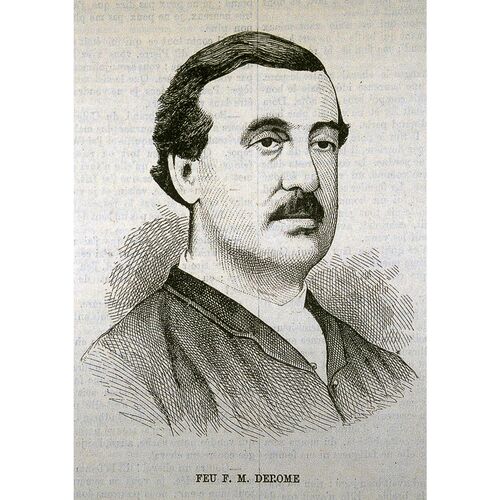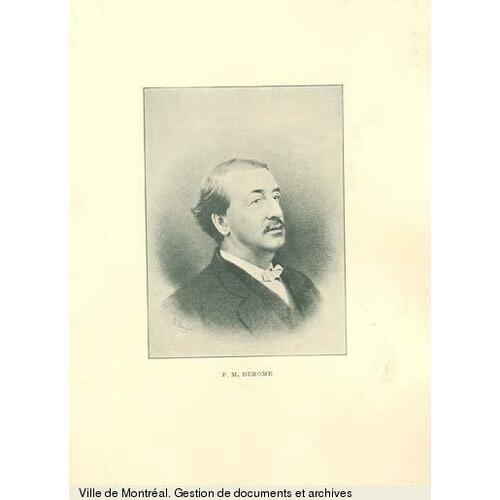DEROME, FRANÇOIS-MAGLOIRE, lawyer, writer, journalist, protonotary, and clerk of the crown and of the peace; b. 1821 at Montreal, L.C., son of François Derome and Éléonore Pagé; d. 30 July 1880 at Rimouski, Que.
From 1830 to 1835 François-Magloire Derome was a brilliant student at the college of Sainte-Anne-de-la-Pocatière, and already showed his literary talents by winning French essay prizes and writing for newspapers. On 19 Oct. 1842, after studying law under Augustin-Norbert Morin*, he was called to the bar; he carried on his profession at Montreal and at the same time contributed to newspapers.
As a writer Derome first attracted attention by his poetry. Particularly during his youth, he published poems in the press; with its nationalist themes, this poetry placed him among the French Canadian pre-romantics, and, though somewhat dull, it won him the honour of appearing in the Repertoire national. . . . One of his poems, “Le Lendemain,” published in Le Canadien in 1841, caused a certain stir, especially among the Anglophones, when it was translated in the Quebec Mercury. In it Derome denounced the loss of liberty:
Non, le bonheur, ni les chants qu’il inspire,
N’existe point où meurt la liberté
No, neither happiness nor the songs that from it spring,
Can exist where liberty is no more,
and in particular he heralded a resurgence of the Canadiens:
Le peuple un jour aura son lendemain!
The people one day will have its tomorrow!
His career as a journalist was longer and more brilliant. After writing several articles for various journals while he was studying law, Derome was editor of the Mélanges religieux in 1851 and 1852; in 1854 he replaced Ronald MacDonald* at the head of Le Canadien, and remained in this post until 1857. He accepted and continued the paper’s moderate tendency, and supported the Liberal-Conservative coalition of 1854. When introducing Derome to its readers, Le Canadien portrayed him accurately as a well-informed man of rare talent, who wrote his language with an elegance and purity uncommon in Canada.
In 1857 Derome gave up active journalism to become protonotary of the crown and clerk of the peace at Rimouski. He continued to contribute to the Foyer canadien and the Revue canadienne, but he gave more of his time to the study of law, and was of great service to his colleagues at the bar on difficult questions. He left this post only in 1878.
On 30 July 1880 François-Magloire Derome died of pneumonia at his residence at Rimouski. He had been married twice: first to Théotiste Labadie, in September 1848; secondly, in 1869, to Malvina Langevin, sister of Jean-Pierre-François Laforce* Langevin, bishop of Rimouski, and of Sir Hector-Louis Langevin*. In 1876 his daughter Malvina married Louis-Napoleon Asselin, who was the father of a “dynasty” of Rimouski lawyers.
Le Canadien (Québec), 1854–57. Le Courrier du Canada (Québec), 9 août 1880. Le Nouvelliste de Rimouski, 1876–80. Catalogue des anciens élèves du collège de Sainte-Anne-de-la-Pocatière, 1827–1927 (Quebec, 1927). Morgan, Bibliotheca Canadensis, 101–2. Tanguay, Dictionnaire, III, 355. Le répertoire national, ou recueil de littérature canadienne, James Huston, edit. (4v., Montreal, 1848–50), II, 205.
Cite This Article
Nive Voisine, “DEROME, FRANÇOIS-MAGLOIRE,” in Dictionary of Canadian Biography, vol. 10, University of Toronto/Université Laval, 2003–, accessed January 1, 2026, https://www.biographi.ca/en/bio/derome_francois_magloire_10E.html.
The citation above shows the format for footnotes and endnotes according to the Chicago manual of style (16th edition). Information to be used in other citation formats:
| Permalink: | https://www.biographi.ca/en/bio/derome_francois_magloire_10E.html |
| Author of Article: | Nive Voisine |
| Title of Article: | DEROME, FRANÇOIS-MAGLOIRE |
| Publication Name: | Dictionary of Canadian Biography, vol. 10 |
| Publisher: | University of Toronto/Université Laval |
| Year of publication: | 1972 |
| Year of revision: | 1972 |
| Access Date: | January 1, 2026 |


![Feu F. M. Derome [image fixe] / A.S. Brodeur Original title: Feu F. M. Derome [image fixe] / A.S. Brodeur](/bioimages/w600.4164.jpg)


